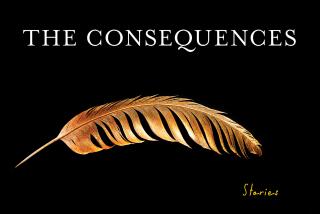Kent Haruf dies at 71; novelist illuminated small-town life
- Share via
Kent Haruf, who found acclaim in midlife with a trilogy of sparely written novels, including the 1999 bestseller “Plainsong” that illuminated the rhythms and dramas of small-town life in America’s High Plains, died Sunday in Salida, Colo. He was 71 and had cancer, according to a spokesman for his publisher, Knopf Doubleday.
Haruf (pronounced like sheriff) rooted his novels in the fictional small town of Holt, a composite of the three Colorado towns where he grew up.
His creation inspired him in the same way that the apocryphal Yoknapatawpha County served one of his idols, William Faulkner.
------------
FOR THE RECORD:
Kent Haruf: In the Dec. 4 California section, the obituary of novelist Kent Haruf said he taught at the University of Southern Illinois. The school is Southern Illinois University.
------------
Haruf “has learned from Faulkner the wisdom of knowing something very well, of being at home there, that the more something is specific, the more it is universal,” novelist Richard Russo told the New York Times after “Plainsong” began drawing raves.
The modest Haruf often credited Ernest Hemingway’s work with teaching him to write cleanly and directly while reading Faulkner helped free him to take his stories out of the city.
The title of “Plainsong,” his third novel, referred to the style of singing used in the earliest centuries of Christianity. Like the alternating voices typical of that music, Haruf interweaved the stories of six major characters, including a pregnant teenager whose mother kicks her out of the house, a high school teacher abandoned by his wife, and two elderly brothers living on a ranch far from town.
“Haruf’s narrative voice is spare and procedural, and his salt-of-the-earth characters are reticent almost to the point of mannerism until it becomes clear that their terseness is the result of profound shyness and an immensity of feeling,” Donna Seaman wrote in Booklist.
Michiko Kakutani of the New York Times was also lavish in her praise, writing that Haruf orchestrated his characters’ convergence “with such authority and grace that their stories materialize before the reader’s eyes without a shred of contrivance.”
The novel was created after Haruf decided to break out of his routine and write blind, literally: He took off his glasses and typed the first draft with a stocking cap covering his eyes.
His intention, he told Publishers Weekly, was “to achieve freshness and spontaneity without being distracted by the sight of words on the page.” The book not only far outsold his first two novels but was a National Book Award finalist.
Born in Pueblo, Colo., on Feb. 24, 1943, the novelist was one of four children of Louis Haruf, a Methodist preacher, and his wife, Eleanor, a teacher and homemaker.
As a child he was left with a partially corrected cleft lip after the surgeon who operated on him died. The condition caused him much embarrassment, but in a recent essay for the literary magazine Granta he acknowledged that “perhaps those years of unhappiness and isolation and living inwardly to myself have helped me to be more aware of others and to pay closer attention to what others around me are feeling.”
After earning a bachelor’s degree from Nebraska Wesleyan University in 1965, he spent a year in Turkey for the Peace Corps and began writing stories. During the Vietnam War he received conscientious objector status and worked in an orphanage and a hospital.
Determined to become a writer, he applied to the prestigious Iowa Writers Workshop at the University of Iowa but was rejected. Undaunted, he moved to Iowa and at 30 was working as a janitor at the school when the program finally accepted him.
In 1976 he became an assistant professor at Nebraska Wesleyan and continued to develop his writing while raising a family with his first wife, Virginia Koon. He finally published a short story in a literary magazine in 1984, when he was 41.
That year also brought his debut as a novelist with “The Tie That Binds,” about a woman who gives up the chance to marry the man she loves to care for a cruel, crippled father. The book won a Whiting Writers’ Prize and high praise from critics, including Chris Wall in the Los Angeles Times who called the novel “an impressive, expertly crafted work of sensitivity and detail, absent the hokum that usually accompanies sad tales of simple women and their domineering fathers.”
Haruf’s next novel, “Where You Once Belonged” (1990), revolves around a former high school football hero whose villainy wreaks havoc in the lives of his Holt neighbors. Los Angeles Times critic Richard Eder called it a “stirring and remarkable” story propelled by a “terse and beautifully wrought” narration.
“Eventide” (2004), Haruf’s fourth novel, revisited characters from “Plainsong,” showing them grapple with dramatic and, in the case of the elderly brothers, traumatic changes, while “Benediction” (2013) concerned a dying man and his small town’s reaction to his death.
Haruf’s last novel, “Our Souls at Night,” will be published next year, according to Knopf.
Haruf taught fiction at Southern Illinois University in Carbondale for a decade before moving back to his native Colorado in 2000. He lived in a log house in the mountains near the town of Salida with his second wife, Cathy Dempsey. She survives him along with three daughters, five stepchildren, two brothers, a sister, and grandchildren.
------------
FOR THE RECORD
Dec. 4, 1:40 p.m.: An earlier version of this article said Haruf taught at the University of Southern Illinois. The school is Southern Illinois University.
------------
Twitter: @ewooLATimes
The Associated Press contributed to this report.
More to Read
Start your day right
Sign up for Essential California for the L.A. Times biggest news, features and recommendations in your inbox six days a week.
You may occasionally receive promotional content from the Los Angeles Times.





